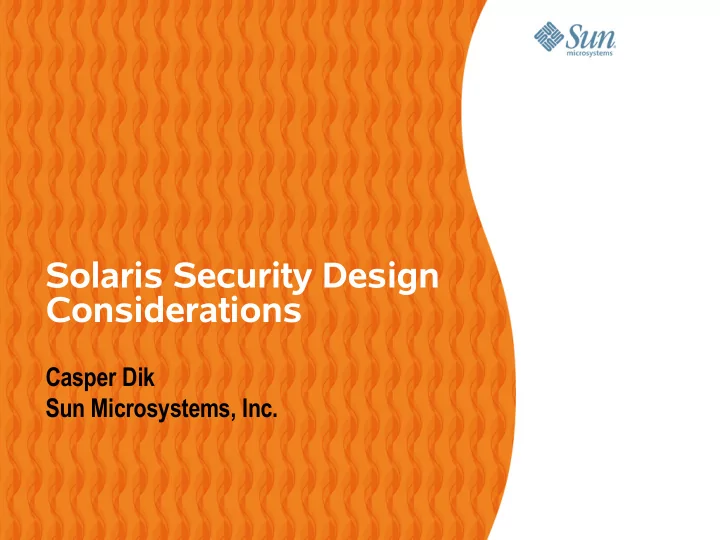

OPG Leadership Series Solaris Security Design Kickoff, Considerations September, 2005 Casper Dik Sun Microsystems, Inc.
Solaris Security Design Principles Or how ten years changed my perspective on security • History of fixes and hardening • Solaris 10 • Look at the future • My greatest frustration 2
What was wrong? • Bugs • Configuration issues • Software reuse 3
Bugs • Retraining programmers • Fixing bugs • Codesweep • Automated Scanning 4
Improving code quality • Security awareness training • Better programming interfaces • Different programming languages 5
Bugs: Optimist's view • And then you're done! 6
Bugs: Pessimist's view • Programmers come and go > Continuous training required • Training doesn't stick • Much code imported from the outside • Code evolves to evade automated scanning • Code increases 10-50 fold > And so do bugs • Where there are bugs, there are security bugs 7
Bugs: Pessimist's view • Different programming languages, different security issues • You can write C/FORTRAN in any language 8
Bugs: Open versus Closed source • Ross Anderson[2002]: Security in Open vs Closed Systems > Defender and attacker helped equally • So what happens when transitioning? > Tested in OpenSolaris > Not much, so far 9
Bugs: Realist's view • Fixing bugs helps • Fixing bugs is not sufficient 10
Configuration • “Ease of Use” trumped Security • Services defaulted to on • Access defaulted to open • Complaints when defaults changed > Remember /etc/hosts.equiv with “+” in SunOS 3 & 4? 11
Configuration • Backward compatibility King • “Like turning a supertanker” > File permissions fixed > New network services default to off • Everything defaults to off > Except sshd 12
Configuration • System must be secure with defaults • Disabled services must be secure, too! 13
Changing World • Everything is connected • Much is wireless • Dynamic content • Webify Everything > Controlled Environment -> Internet • Software reuse?!? 14
What we have • Bugs • Enabled Services • Users • System Administrators 15
What I want • Security: > With bugs > Without firewalls > While doing useful work > Without virusscanners 16
Design for Resilience • Tamper proof • Tamper resistant • Tamper evident 17
Security Evolution in Solaris 10 • Cryptographic Framework • Privileges • Loopback Credentials • Zones • RBAC • SMF • BART • Trusted Extensions 18
Cryptographic Framework • Cryptographic Algorithms > encrypt(1), decrypt(1) • Digests > digest(1) • Random number generator 19
Cryptographic Framework • Two software instances of all algorithms > One Userland > One Kernel • Completely Pluggable > Add accelerator (different implementation) > Add new algorithm • 128-bit crypto standard > Import restrictions in some countries 20
Privileges • Privileges with a pragmatic twist • Principle of Privilege Escalation Prevention > “You need as many Privileges as you can get” • Basic Privileges > Privileges required for previously unprivileged actions > Execve, fork, viewing other people's processes > Extensible • Hard privilege limit > Privileges processes can never exceed 21
Privileges • Privileges needed to control other process > Superset of privileges available in that process • Privileges needed to write to /dev/*mem, /dev/dsk/* > All privileges defined in the system • Users can be prevented from ever performing some tasks 22
Loopback Credentials • Loopback server now knows who connects > Uids > Gids > Privileges > Audit attributes > Zone 23
Zones • Virtual OS Instance • Ease of administration • Compartmentalize • Separate namespaces • Resource controlled • Observable from the global zone 24
Service Management Facility (SMF) • Single set of commands for all services • Service dependency graph • Restarts failed services • Delegation of administrative authorizations 25
Role Based Access Control (RBAC) • Allows assigning Authorizations and Roles to users • Allows running privileged commands by unprivileged users or roles 26
BART • Basic Auditing and Reporting Tool • Verifies file contents and attributes • To be integrated with online database > SunSolve Fingerprint database 27
Signed Binaries • All Solaris 10 binaries carry a signature > Binaries can be verified off-line > Obviously not on a compromised system • Requirement for export of “ Crypto with a hole” > Crypto plugins must be signed > No obvious restrictions on who can get certificate > Strong crypto unbundled because of import restrictions 28
Signed Execution (Future) • Allow restrictions on the executables run • Allow restrictions on the kernel modules loaded • You are in control! 29
Secure Boot (Future) • Verify all binaries while they are loaded • Hardware assist required for full feature set > TPM > But system administrator in control 30
Trusted Extensions (Soon) • Labeled zones • Trusted Networking (labeled networking) • Trusted Window System • Replaces Trusted Solaris 31
Unbundled Tools • Hardening toolkits > But more and more obsolete • Findrootkit (to be released) 32
My Greatest Frustration • Incompetent Security Auditors • About as advanced and scientific as > Bloodletting/Leeches > Animal Sacrifice > Palm reading • Random, Unmotivated, Requirements > Known to break systems > Inflexible 33
Relevant Security Pages • Sun Security Home Page > http://www.sun.com/security/ • Solaris Patches & Fingerprint Database > http://sunsolve.sun.com/ • Sun Security Coordination Team > http://sunsolve.sun.com/security/ • Sun BluePrints for Security > http://www.sun.com/security/blueprints/ • Solaris Security Toolkit > http://www.sun.com/security/jass/ 34
Relevant Blogs • Glenn Brunette > http://blogs.sun.com/gbrunett • Alec Muffett > http://blogs.sun.com/alecm • Casper Dik > http://blogs.sun.com/casper 35
Get The Source! • http://cvs.opensolaris.org > Source repository • http://www.opensolaris.org > Discussions, binaries and all the rest • http://blogs.sun.com/ > Engineers explaining their bit of Sun Software 36
OPG Leadership Series Solaris Security Design Kickoff, Considerations September, 2005 Casper Dik Sun Microsystems, Inc. http://blogs.sun.com/casper
Recommend
More recommend